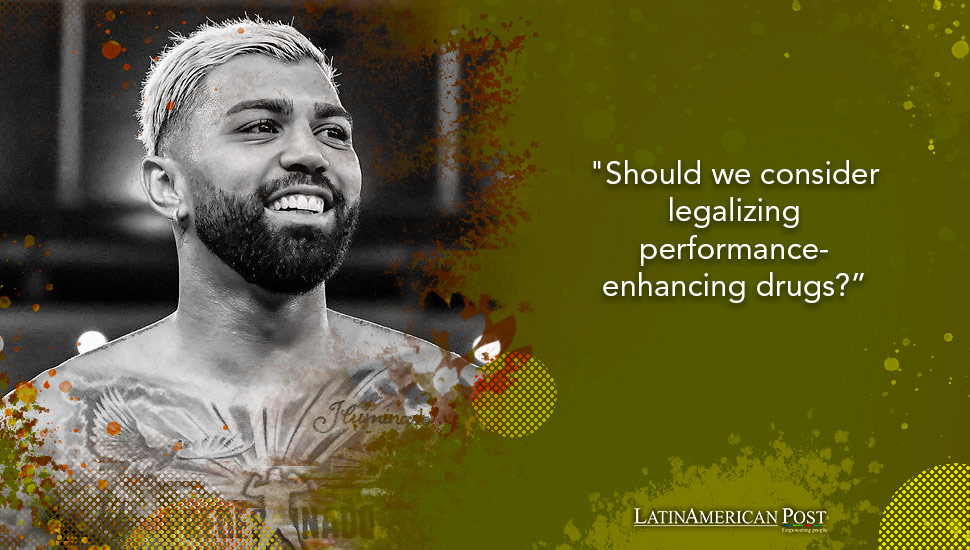Brazil’s Gabigol Case: Time to Legalize Performance Enhancers in Sports?

The suspension of Brazilian soccer player Gabriel Barbosa’s doping ban raises pressing questions about the efficacy and consistency of sports’ disciplinary systems. If these systems falter, should we consider legalizing performance-enhancing drugs?
The world of sports is again at a crossroads following the temporary lifting of a doping ban against Gabriel Barbosa, commonly known as “Gabigol.” The Brazilian striker, who plays for Flamengo, was initially handed a two-year suspension for allegedly disrupting an anti-doping test and showing disrespect towards the officials involved. This case underscores a broader, ongoing dilemma: the challenges of enforcing anti-doping regulations in sports and the potential need to reconsider our approach, perhaps even moving toward the legalization of certain performance-enhancing drugs (PEDs).
Challenges in Doping Regulation: The Gabigol Case
In March, the anti-doping justice of Brazil accused Gabigol of attempting fraud during a routine doping test at Flamengo’s training center in Rio de Janeiro. Among the violations cited was his refusal to comply with testing protocols, including taking a lunch break before submitting a urine sample, which he eventually delivered irregularly. These actions led to a two-year ban, highlighting not only the seriousness of the offense but also the stringent measures in place to combat doping in sports.
However, based in Switzerland, the Tribunal de Arbitraje Deportivo accepted an appeal from the player’s lawyers, resulting in a temporary suspension of the ban. This decision allows Gabigol to return to competition pending a more detailed analysis of the accusations, which is expected in the coming months.
This incident brings to light several critical issues. Firstly, the inconsistency and sometimes the apparent inefficacy of sports’ disciplinary systems can undermine the fight against doping. If athletes can circumvent penalties through legal appeals, this might encourage rather than deter the use of banned substances.
Secondly, the Gabigol case reflects a broader pattern observed in Brazil and across Latin America, where enforcing doping regulations often faces challenges such as lack of resources, corruption, and legal loopholes. These issues complicate efforts to maintain a clean and fair sporting environment, prompting some to argue for the reevaluation of the prohibition of PEDs.
Debate on Legalization
Advocates for the legalization of performance-enhancing drugs cite several benefits. Legalization could lead to regulating and safely using these substances, potentially reducing the health risks associated with their unregulated use. Moreover, it could level the playing field, as some argue that the current prohibition disproportionately affects athletes from countries with more stringent testing procedures.
However, opponents of legalization stress the potential for an arms race in performance enhancement, which could push athletes towards ever more extreme measures to gain a competitive edge. This could exacerbate health risks and widen the gap between wealthier athletes or teams that can afford cutting-edge enhancements and those that cannot.
The debate also touches on the philosophical aspect of sports. What are sports meant to showcase? If the answer leans towards human limits and natural talents, then PEDs could be seen as detractors of these values. However, if sports are viewed through the lens of entertainment and spectacle, a reevaluation of PEDs’ role could be justified.
The situation with Gabigol is a poignant example of the complexities involved in policing sports. While it’s crucial to uphold standards that promote fair play and protect athletes’ health, the recurring challenges to doping regulations suggest that our current methods might not be as effective as we hope.
Towards a Solution
As we navigate this dilemma, engaging in a broader dialogue that includes athletes, coaches, regulatory bodies, and fans is essential. The goal should be to forge a consensus on the best way forward, whether that involves reforming the existing framework to ensure more consistent and effective enforcement or radically rethinking our stance on performance enhancement in sports.
Also read: Brazilian Left-Wing Tax Policies Are Inadequate Solutions for Economic Growth
Ultimately, the decision to legalize PEDs should not be taken lightly. It requires careful consideration of the medical, ethical, and competitive implications. However, as cases like Gabigol’s continue to surface, they push the boundaries of the ongoing debate, compelling us to confront these difficult questions head-on. Whether legalization is the answer or not, one thing is clear: the current state of sports doping regulation is far from perfect, and significant changes are necessary to preserve the integrity of competitive sports.





